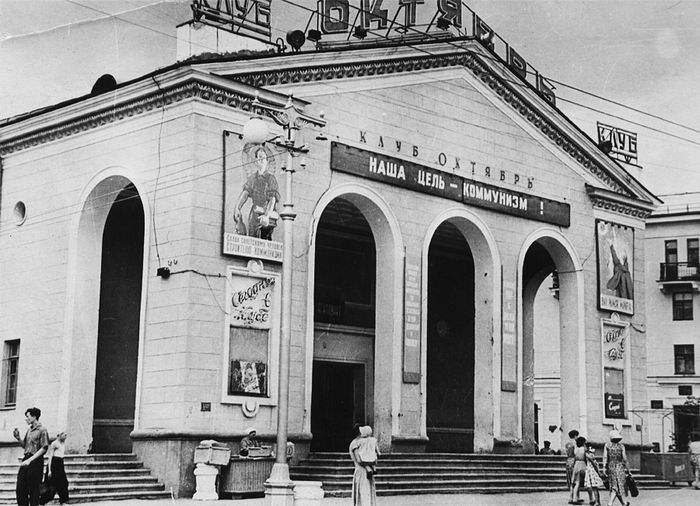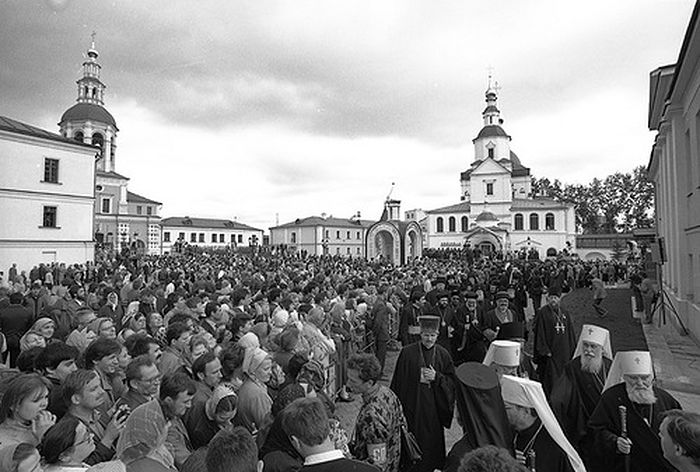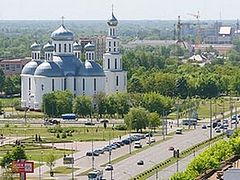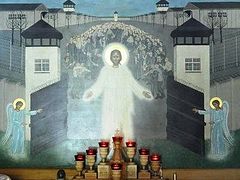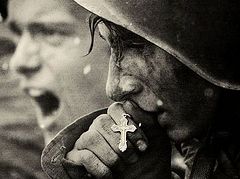Sending the students of our Sretensky Seminary on summer vacation, we gave them an assignment: to meet with Christians two or three generations older than today’s youth and ask them about what was happening in the lives of those in the state who rebelled against God, and then tired of this rebellion, realized its futility and meaninglessness, about how they found and preserved their faith, and most importantly, what conclusions they arrived at as they approach the zenith or the sunset of their earthly journey.
I must say that all the students fulfilled this obedience with great benefit for themselves, and for us as well, their mentors and educators. All of their observations and notes, without exception, were extremely interesting. We would like to acquaint our readers with some of these works.
Bishop Tikhon,
Editor-in-Chief of Pravoslavie.ru
* * *
Nun Lydia (Derzhavina) was born in 1936. She is the widow of Archpriest John Derzhavin and the mother of eleven children. All the children in the Derzhavin family have connected their lives with the Church: three sons are priests and two daughters are matushkas. In this interview Matushka Lydia speaks about the spiritual significance of the Great Patriotic War (World War II) for the Russian people, on the severe trials that befell the Church in the twentieth century, and on contemporary temptations.
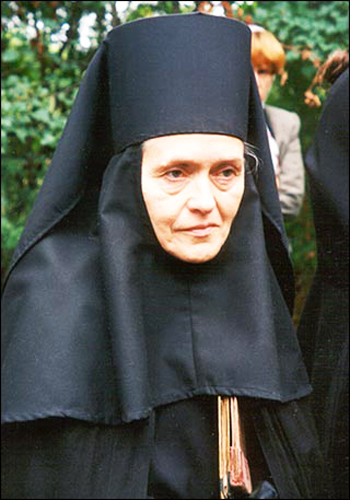
—What recollections do you have of the twentieth century, beginning with the Great Patriotic War?
—The Lord gave us the war for people to return to God. And in fact, that’s what happened. When the war began, firstly, Stalin remembered that the people are strong precisely in faith; and he addressed the people as “brothers and sisters,” as before, and not as “comrades,” as was customary for them.
The war served as a cleansing of the people. Of course the losses were huge, but still, the Lord gave us victory. Because the war began on the day of All Russian Saints (and by that time we already had very, very many Russian saints, although many were not glorified; how many New Martyrs were there before the war?), they did not forget the homeland in their prayers, but prayed for it. They prayed in Heaven, and here on Earth churches started to open, and they were filled with people. They all prayed for victory. The Church played a large role in uniting and inspiring the people to pray for victory.
—How did the people approach God after the war? How did the authorities begin to relate to the Church?
—They achieved victory, but persecutions continued against the Church all the same, especially under Khrushchev in the 1960s. For example, the church where they baptized us, where I was married, was dismantled for firewood and burned under Khrushchev, and only the foundation remained. The atheist campaign was very forceful. They urged many priests to recant. A KGB agent from Samara came to my husband, too. He was on a UAZ military vehicle, and Fr. John [the late husband of Mother Lydia—O.C.] had a motorcycle. He told Fr. John, “Follow me,” and they drove into the forest. Because my husband had himself served in the Ministry of Internal Affairs (he was conscripted), he well understood and knew the politics of the Soviet government. He understood that they weren’t just calling him there. This was when we served in Tashla. They drove into the forest. There a KGB officer began to try to persuade Fr. John to give up his priestly rank. He said he was an erudite man and could perhaps graduate from an institute and maybe be in a leadership role, as he had great ability, knowing how to give homilies. Fr. John, of course, refused. He later said that he had the thought that he might not return from that forest, that they could shoot him right there on the spot, but the Lord saved him. There were very few such priests of course, who refused. They were one in a million. Then there was a campaign to seduce the most faithful people, telling them, “Look, see, even the priests have renounced their faith.” They said the priests had deceived them, but the believers did not yield—only those of little faith were affected. The Lord said that the gates of hell shall not prevail against the Church, but godless campaigns have been happening all throughout our history, from the first centuries until the present day.
—How was life after Khrushchev, in the 70s?
—Well, somehow it was easier. And when the 1000th anniversary of the Baptism of Rus’ began to come together, and the government even somehow took part, it was lighter still…
—In general, how was life in the USSR?
—In Leningrad, after the war, everything was very difficult. There were lines for sugar, flour in ’46, ’48, and ’50. State policy was like this: People lived then in communal apartments, and someone would say to one neighbor: “Keep an eye on this neighbor, he’s not trustworthy. Even if you only have a little to say, report everything to us.” And to the “untrustworthy” they said: “Follow this neighbor [the one they asked to follow him],” making similar accusations about him. Ratting and spying on one another had developed, so we were afraid to say something even in line, and had to whisper everything. Or if you had a bad dream about Stalin and word of it reached the authorities, they could throw you in prison for it. People knew this and so they were afraid to talk.
But there was faith in the hearts of the people; the Russian people preserved faith, as they said: The [women in] white headscarves saved us. That is, men were afraid to cross the threshold of the Church because there was surveillance, and you could be fired or driven out of the party for getting baptized or having your child baptized. People were baptized at night, going to the priest’s home to get baptized. We had a priest friend who baptized the children of the secretary of the party’s regional committee. All the same, the people believed in their hearts, but not everyone resolved to make such a confession of faith.
We arrived in Samara in 1959, when “Standing Zoe” was still there, and it’s a miracle, a clear miracle which strengthened the people’s faith, but the authorities forbade us to even talk about this miracle.[1] My grandmother lived with us in the village, and her nephew worked then as a policeman, and they sent him to guard this house. Of course we asked him about it, but he showed us an agreement of nondisclosure, which they demanded from all of them. Before my mother he took off his cap and said, “Look what happened during my night shift.” During the night his hair had turned gray.
—How did the return to faith happen after celebrating the 1000th anniversary of the Baptism of Rus’?
—Members of the government began to visit the Paschal and Nativity services and people were going to church. Of course, seventy years of atheist propaganda had erased the reference point, and people didn’t know what to align with, as communism had promised a bright future. They received emptiness, and the youth found it very hard to reorient themselves. In fact, this problem still exists. Now we have every possible sect spread everywhere with their lectures, psychics, and witches, and so many people, of course, are completely disoriented.
—Do you agree with A. I. Osipov’s opinion that it was simpler in the USSR because you had either atheism or faith, but now everything is more difficult in light of this diversity of teachings?
—Yes. I always said it was easier for our children, because they well knew: here is the Church, there is communism, that is, atheism. And now good and evil are all mixed up, the borders have been erased from our consciences—what was bad is now considered good. The borders of what is sin and what is not have been erased from people’s consciences. Things are very difficult now…
—How did you celebrate Orthodox feasts?
—We painted all the eggs at home and basically did everything at home. We baked kulichi. In St. Petersburg, for example, they sold “spring cakes”—kulichi, just with a different name. They sold them in the stores. Youth weren’t allowed in church on Pascha. Komsomol guards stood there, not letting them in.
When it was time to hold elections, the Soviet leadership would arrange them either in the first week of Great Lent, the Sunday of the Orthodoxy, or on Pentecost.
Once the elections were on Pentecost. They called my husband to the village council and said:
“You will not serve on Pentecost.”
“Why?”
“Because of the elections; otherwise the people will all go to church instead of going to vote.”
“I cannot not serve because I gave an oath to serve. I must serve.”
“And yet you will not serve.”
“Well, if you write me a written order that you forbid me to serve on Pentecost, then I will not serve. I will go to Moscow with your document to Commissioner Kuraedov.”
“We can’t write such an order.”
“Then I am unable to not serve.”
“Then you will finish the service by 6 AM.”
But Fr. John was not at all afraid of them, and said to them, “His reverence deigns to rise only at 8 in the morning.”
In general, they accomplished nothing.
Another time, when allegedly hoof and mouth disease spread to the cattle throughout the village (and maybe it really did—there used to be a lot of cattle and now there’s almost none) measures were taken to limit the spread of the disease, a quarantine. It affected the Church. Under pressure from the authorities, the ruling hierarch forbade the priests to give the cross to kiss or to commune the people from the same spoon, and it was commanded to forbid the kissing of icons, in order not spread the disease.
Archpriest John received this order and burned it in the stove, and he served how he serves. He said: “Cows don’t come to church.”
Vladyka then came to him and asked:
“How are your fulfilling my order?”
“I threw it in the stove.”
“You did the right thing.”
In general, the times were tough, very tough…
Now the Lord has given freedom: Please, go to church, no one will forbid you; but then again, the devil has amassed so many temptations, every kind of abomination, that it’s difficult again…
—Did the priests have to keep a lot of cows to survive in Soviet times?
—Yes. There were large taxes from the Church, even up to 80 percent I think. Of course they kept cattle, especially those that had large families. But under the Soviets it was impossible to keep a lot of cows. After the war was a time when they took taxes on milk, butter, and eggs. They recorded all the cattle and then collected according to how many you had. And so they became unaccustomed to work. Now you can have as many cows as you want, but nobody wants to… Although now it’s especially important to have healthy food; there are so many chemicals now…
—If you compare Soviet times and now, where was life simpler?
—In the USSR the main principles of life were based on all of the commandments of the Lord (the Ten Commandments) except the first.[2] Dostoyevsky says: “If there is no God, then the Russian man is trash,” or, to the extent a man is Orthodox, so much is he Russian. And if there is no God, then do anything you want. But in the USSR there was morality. For example, they could drive you out of the party for cheating on your wife and marrying another. Now there’s no such thing.
—In leaving out the first commandment, they made themselves gods?
—Yes. “Mankind—how proud that sounds!” These words are attributed to Gorky. But they took the most important thing from the people…
—How should we live now, and how can we bring people to church? How can we unite the morality of the USSR with the freedom we now have?
—Much depends on the priests, on their homilies. They should reach the people. But a man himself always decides. Now you can watch the channel “Soyuz,” which many watch. It’s a matter of choice. You can watch TV and see some kind of garbage or possibly something that is good. It depends on the person.
Many modern Russians have hieromartyrs in their families who suffered for the faith. It sometimes happens that a person was raised in a godless family, and then the Lord somehow draws him to Himself, and this person becomes a believer. Then they learn that there were martyrs in his family. The earthly Church and heavenly are united in prayer.
Archimandrite John (Krestiankin) would say: “Fear nothing, except sin, and the Lord knows how to save His own.”

